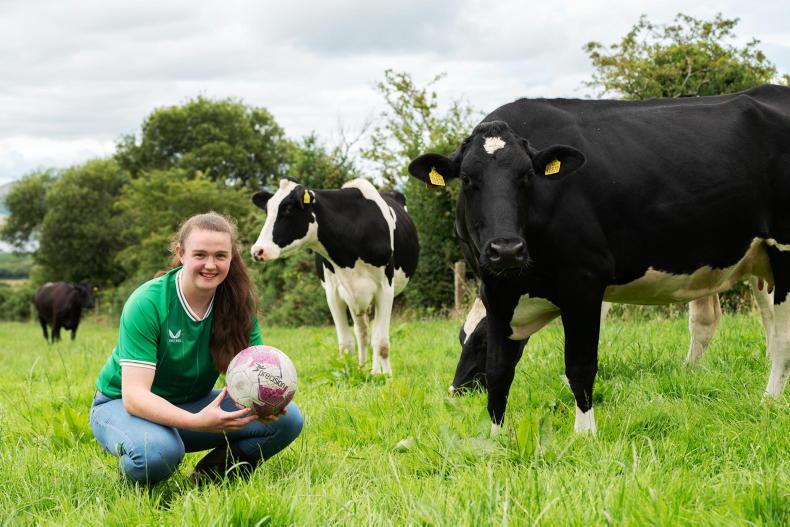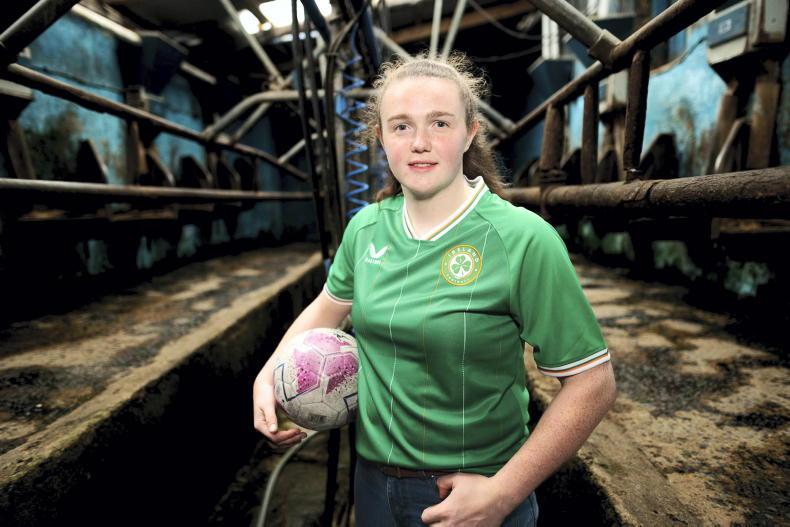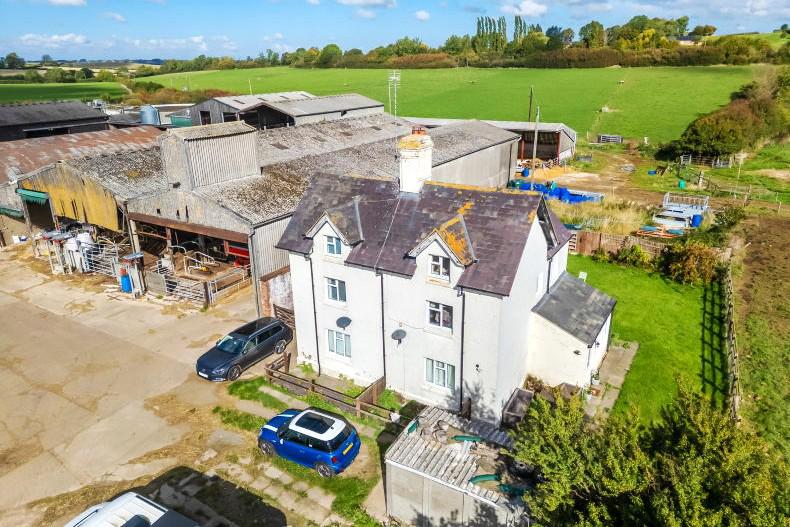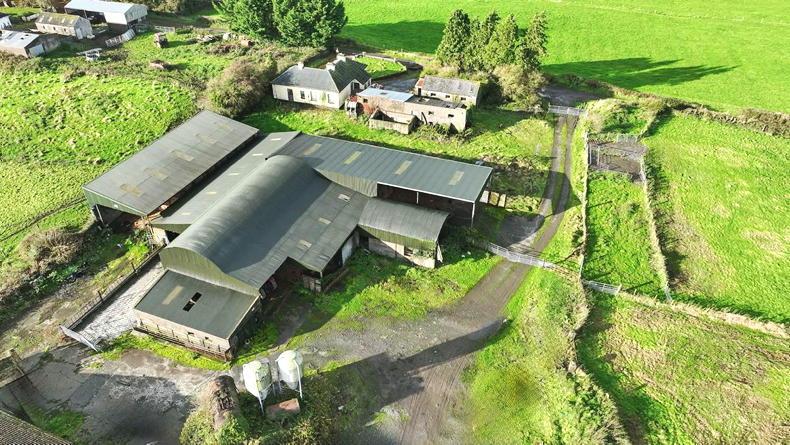In April 2021, Catherine Grier- who was born with profound nerve deafness- received a cochlear implant.
And the then-20 year old Donegal woman knew exactly what sounds she wanted to hear; for the first time in her life.
The cows chewing the cud, the tractor chugging: the every day symphony of farm life that so many take for granted.
It’s not hard to see how much that moment meant to Catherine. As well as playing an active role on the family farm in Ramelton, she was the first female to win the Irish Holstein Friesian Association (IHFA) Bursary award in 2022 at Gurteen College, and is now going into the final year of her degree in animal and crop production at ATU in Donegal. She also recently qualified for the handling class of the IHFA National Calf Show, having started showing calves for the Dalevalley Prefix three years ago.
But this November, she will swap her wellies for football boots as she represents her country as part of the Irish Deaf Women’s Futsal team at the World Cup in Brazil.
Catherine, now 22, farms alongside her father Alastair. They have a herd of 45 pedigree Holstein cows under the Swilly prefix. Catherine is involved in every aspect of the operation; but especially enjoys milking.
Growing up with profound nerve deafness, however, presented some challenges on the farm, despite wearing hearing aids from the age of five.
For instance, she could not hear her father calling her name or the sounds of the tractor or other machinery in the yard.
Pursuing her passion
Still, Catherine was determined to pursue her passion. At 17, for example, she completed the three-day DIY AI course with Dovea Genetics, and after finishing school, spent two years at Gurteen College studying for her level six certificate in dairy herd management.
Catherine explains that for lectures, she would lip read as well as use the microphone on her hearing aids, but that outdoor practical sessions were more challenging.

Catherine Grier farms with her father Alastair in Ramelton, Co Donegal. \ Clive Wasson
“It was difficult hearing the lecturers or farm staff due to the background noise of machinery and livestock and especially the wind. This made me have to work harder to lip read,” says Catherine, though she adds that college staff were always helpful and happy to repeat anything she may have missed.
The outbreak of COVID 19, however, brought both pluses and minuses. While Catherine was initially dreading having to attend lectures online, the fact that lecturers could add subtitles to the calls and recordings was a game-changer.
Returning to campus for second year, however, was difficult, as with mask-wearing, Catherine was unable to lip read.
“The lecturers then decided to try the COVID face shields, but that was still no good as all I could see was the reflection of the light on the shield,” she continues; but fortunately, the disability officer in the college was able to organise a note taker to sit with Catherine for lectures.
“This made my learning experience so much easier,” she adds.
Life-changing procedure
Mid-way through her 16-week placement, however, Catherine received a “very last-minute offer to have the cochlear implant operation”. As Catherine’s hearing had started to deteriorate more rapidly from 2018 onwards, she decided to go for it.
A cochlear implant is an electronic device that mimics the function of the inner ear, providing a sensation of sound by stimulating the auditory nerve directly. While not suitable for everybody, for Catherine, it proved a game-changer.
“We were back on campus for the final few weeks on the course and immediately I could see a massive change. I could hear again; even with the masks on I could pick up some of what the students were saying,” recalls Catherine, though she jokes that “some accents were much harder than others.”

Catherine Grier is now going into the final year of her degree in animal and crop production at ATU in Donegal. \ Clive Wasson
The implant has also made a difference to her work on the family farm, while she also has a lot more confidence taking phone calls or in agri and social settings, like the mart.
And Catherine not only went on to earn an overall distinction for her certificate in Gurteen; she was the first female to win the IFHA Bursary
award too.
Now a student at ATU Donegal, Catherine says there has been an adjustment in terms of exams etc, but she has received support in the form of a note taker for lectures. She hopes to graduate in 2024 and is keeping her options open after that.
“It’s hard to say what my career path will be as there are different options like sales person, advisory, teaching or even advancing onto a master’s degree,” she says. “I aim to take every day as it comes for now and make a decision in due course.”
Futsal
In the meantime, there is the matter of representing her country in Brazil this November at the fifth World Deaf Futsal Championships.
Growing up, Catherine always enjoyed playing sports, but as with farming, being deaf presented some challenges.
“I couldn’t hear what the coaches were saying during drills or games as all I could hear was the amplified sound of the wind blowing into my hearing aids,” explains Catherine.
“Therefore, I always stood back and copied the others in football drills and had to wait until half- time during a match before communicating with the manager.”
Undeterred, Catherine continued to train and currently plays at club level with Bonagee United, recently reaching the finals of the FAI Intermediate Cup.
In 2017, however, she also discovered futsal- a fast and furious five-a-side football based game, played indoors on a hard court- after her mother Monica came across an ad on Facebook for the Irish Deaf Women’s team.
“I went to Dublin for trials in 2017 and somehow made the team,” recalls Catherine; yet, she adds, the transition to playing on a deaf team was not exactly seamless either.

Catherine Grier has received a life changing cochlear implant which has made a huge difference to her farming life. \ Clive Wasson
“We had to play without our hearing aids and cochlear implants, and it became very overwhelming as other girls were using sign language to communicate, another thing which I have never seen before,” she explains.
“I was lucky to not be the only one in that situation and some of us relied on lip reading instead. I’ve learned to read some sign language and I know the alphabet, but that’s about it!”
Once Catherine adjusted, however, she made a serious impact. At her first European qualifier tournament in January 2018, she was named player of the match against Holland; a title she has picked up on several occasions since at European and world finals, along with earning 19 caps and scoring 13 goals to date for Ireland.
At present, Catherine is travelling to Dublin every second weekend to train with the squad in advance of the world cup in November; but is also trying to raise €1,000 to help cover her travel and accommodation costs. Fortunately, family and friends have been supportive, while Catherine’s local feed supplier, Smyths Daleside Feeds, has also come on board.
We ask what it means to Catherine to represent her country?
“It actually means the world to me because we’ve come such a long way as a small team from Ireland and we’ve been through different tournaments together- we’ve already been to a world cup in Switzerland- but we’ve managed to bring in more players, which has made this team stronger than ever,” she smiles.
More info:
Anybody who is interested in supporting Catherine on her world cup journey can email catherinegrier7@gmail.com for further information. You can also find out more about the Irish Deaf Women’s Futsal Team at facebook.com/IDWFT
Read more
Rise: ‘you’re on a rollercoaster and if you get off, you go nowhere’
Rise: finding her rainbow's end
In April 2021, Catherine Grier- who was born with profound nerve deafness- received a cochlear implant.
And the then-20 year old Donegal woman knew exactly what sounds she wanted to hear; for the first time in her life.
The cows chewing the cud, the tractor chugging: the every day symphony of farm life that so many take for granted.
It’s not hard to see how much that moment meant to Catherine. As well as playing an active role on the family farm in Ramelton, she was the first female to win the Irish Holstein Friesian Association (IHFA) Bursary award in 2022 at Gurteen College, and is now going into the final year of her degree in animal and crop production at ATU in Donegal. She also recently qualified for the handling class of the IHFA National Calf Show, having started showing calves for the Dalevalley Prefix three years ago.
But this November, she will swap her wellies for football boots as she represents her country as part of the Irish Deaf Women’s Futsal team at the World Cup in Brazil.
Catherine, now 22, farms alongside her father Alastair. They have a herd of 45 pedigree Holstein cows under the Swilly prefix. Catherine is involved in every aspect of the operation; but especially enjoys milking.
Growing up with profound nerve deafness, however, presented some challenges on the farm, despite wearing hearing aids from the age of five.
For instance, she could not hear her father calling her name or the sounds of the tractor or other machinery in the yard.
Pursuing her passion
Still, Catherine was determined to pursue her passion. At 17, for example, she completed the three-day DIY AI course with Dovea Genetics, and after finishing school, spent two years at Gurteen College studying for her level six certificate in dairy herd management.
Catherine explains that for lectures, she would lip read as well as use the microphone on her hearing aids, but that outdoor practical sessions were more challenging.

Catherine Grier farms with her father Alastair in Ramelton, Co Donegal. \ Clive Wasson
“It was difficult hearing the lecturers or farm staff due to the background noise of machinery and livestock and especially the wind. This made me have to work harder to lip read,” says Catherine, though she adds that college staff were always helpful and happy to repeat anything she may have missed.
The outbreak of COVID 19, however, brought both pluses and minuses. While Catherine was initially dreading having to attend lectures online, the fact that lecturers could add subtitles to the calls and recordings was a game-changer.
Returning to campus for second year, however, was difficult, as with mask-wearing, Catherine was unable to lip read.
“The lecturers then decided to try the COVID face shields, but that was still no good as all I could see was the reflection of the light on the shield,” she continues; but fortunately, the disability officer in the college was able to organise a note taker to sit with Catherine for lectures.
“This made my learning experience so much easier,” she adds.
Life-changing procedure
Mid-way through her 16-week placement, however, Catherine received a “very last-minute offer to have the cochlear implant operation”. As Catherine’s hearing had started to deteriorate more rapidly from 2018 onwards, she decided to go for it.
A cochlear implant is an electronic device that mimics the function of the inner ear, providing a sensation of sound by stimulating the auditory nerve directly. While not suitable for everybody, for Catherine, it proved a game-changer.
“We were back on campus for the final few weeks on the course and immediately I could see a massive change. I could hear again; even with the masks on I could pick up some of what the students were saying,” recalls Catherine, though she jokes that “some accents were much harder than others.”

Catherine Grier is now going into the final year of her degree in animal and crop production at ATU in Donegal. \ Clive Wasson
The implant has also made a difference to her work on the family farm, while she also has a lot more confidence taking phone calls or in agri and social settings, like the mart.
And Catherine not only went on to earn an overall distinction for her certificate in Gurteen; she was the first female to win the IFHA Bursary
award too.
Now a student at ATU Donegal, Catherine says there has been an adjustment in terms of exams etc, but she has received support in the form of a note taker for lectures. She hopes to graduate in 2024 and is keeping her options open after that.
“It’s hard to say what my career path will be as there are different options like sales person, advisory, teaching or even advancing onto a master’s degree,” she says. “I aim to take every day as it comes for now and make a decision in due course.”
Futsal
In the meantime, there is the matter of representing her country in Brazil this November at the fifth World Deaf Futsal Championships.
Growing up, Catherine always enjoyed playing sports, but as with farming, being deaf presented some challenges.
“I couldn’t hear what the coaches were saying during drills or games as all I could hear was the amplified sound of the wind blowing into my hearing aids,” explains Catherine.
“Therefore, I always stood back and copied the others in football drills and had to wait until half- time during a match before communicating with the manager.”
Undeterred, Catherine continued to train and currently plays at club level with Bonagee United, recently reaching the finals of the FAI Intermediate Cup.
In 2017, however, she also discovered futsal- a fast and furious five-a-side football based game, played indoors on a hard court- after her mother Monica came across an ad on Facebook for the Irish Deaf Women’s team.
“I went to Dublin for trials in 2017 and somehow made the team,” recalls Catherine; yet, she adds, the transition to playing on a deaf team was not exactly seamless either.

Catherine Grier has received a life changing cochlear implant which has made a huge difference to her farming life. \ Clive Wasson
“We had to play without our hearing aids and cochlear implants, and it became very overwhelming as other girls were using sign language to communicate, another thing which I have never seen before,” she explains.
“I was lucky to not be the only one in that situation and some of us relied on lip reading instead. I’ve learned to read some sign language and I know the alphabet, but that’s about it!”
Once Catherine adjusted, however, she made a serious impact. At her first European qualifier tournament in January 2018, she was named player of the match against Holland; a title she has picked up on several occasions since at European and world finals, along with earning 19 caps and scoring 13 goals to date for Ireland.
At present, Catherine is travelling to Dublin every second weekend to train with the squad in advance of the world cup in November; but is also trying to raise €1,000 to help cover her travel and accommodation costs. Fortunately, family and friends have been supportive, while Catherine’s local feed supplier, Smyths Daleside Feeds, has also come on board.
We ask what it means to Catherine to represent her country?
“It actually means the world to me because we’ve come such a long way as a small team from Ireland and we’ve been through different tournaments together- we’ve already been to a world cup in Switzerland- but we’ve managed to bring in more players, which has made this team stronger than ever,” she smiles.
More info:
Anybody who is interested in supporting Catherine on her world cup journey can email catherinegrier7@gmail.com for further information. You can also find out more about the Irish Deaf Women’s Futsal Team at facebook.com/IDWFT
Read more
Rise: ‘you’re on a rollercoaster and if you get off, you go nowhere’
Rise: finding her rainbow's end











SHARING OPTIONS